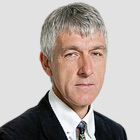The limos have been booked. Hotels have loaded up with champagne. Shops have been converted into pop-up offices for the tech giants. The annual Davos talkfest is about to begin.
The collective mood of the 2,800 participants is anything but cheery as they make their way to the small Alpine town immortalised by Thomas Mann in his novel The Magic Mountain for the annual meeting of the World Economic Forum (WEF).
That’s because there are four “C”s that will dominate this year’s event: conflict; the new cold war; climate; and chaos – or the potential for it, arising as a result of misuse of artificial intelligence by hostile states and criminals. As usual, there will be plenty of partying and business deals clinched behind closed doors, but the WEF’s dream of a peaceful, prosperous, globalised world have been shattered by recent developments.
Klaus Schwab has been “Mr Davos” since he set up the forum in the early 1970s and is still the organisation’s executive chairman. He said last week: “We face a fractured world and growing societal divides, leading to pervasive uncertainty and pessimism. We have to rebuild trust in our future by moving beyond crisis management, looking at the root causes of the present problems, and building together a more promising future.”
Attacks on shipping in the Red Sea by Iranian-backed Houthi fighters have highlighted the risks of the war between Israel and Hamas escalating into a broader Middle East conflict. So far, fears that the 7 October attacks would lead to a repeat of the 1973 energy shock – a fourfold increase in the cost of crude – have proved unfounded, in part because demand for oil has been weak, but also because the fighting has largely been confined to Gaza. The lengthy re-routing of cargo ships around the Cape of Good Hope has provided a hint of what could happen were the war to spread to Lebanon.
Events in the Middle East have meant less attention has been paid in recent months to the war between Ukraine and Russia, which will soon enter a third year. Ukraine and Switzerland will host about 120 national security advisers on Sunday in Davos, in the latest in a series of meetings to rally support for Kyiv’s peace plan. But with Russia not involved in the talks, there is little chance of the conflict ending, and Ukraine’s president, Volodymyr Zelenskiy, will urge the international community to step up supplies of military equipment when he speaks to the WEF on Tuesday. The UK on Friday announced an increase in its military aid to £2.5bn from April, £200m more than previous years.
Zelenskiy is one of more than 60 heads of state and government at this year’s Davos: a list that also includes France’s Emmanuel Macron and Argentina’s new libertarian president, Javier Milei. China’s leader, Xi Jinping, will not be attending but Beijing will still be sending a big delegation headed by premier Li Qiang. Li’s speech will be carefully analysed for any signs of a thawing in the increasingly frosty relationship between China and the US.
Two risks that once seemed to be clouds on the distant horizon have now become immediate dangers. The WEF’s annual global risks report was dominated by fears that AI – a technology that has advanced rapidly since last year’s Davos – will be used for nefarious purposes, and that time is running out to prevent global heating reaching a tipping point.
It is not all bad news. A year ago, there were fears of a protracted and painful recession as central banks raised interest rates in response to the highest inflation in the west in four decades. At the start of 2024, inflation is coming down and financial markets are anticipating cuts in official borrowing costs. Although the eurozone and the UK may still suffer technical recessions, the pain looks like being short-lived.
Even so, any optimism will be guarded. In the past four years, the global economy has been beset by Covid, a cost of living crisis and war. At Davos 2024, the talk over the canapés will be of what can go wrong next.











